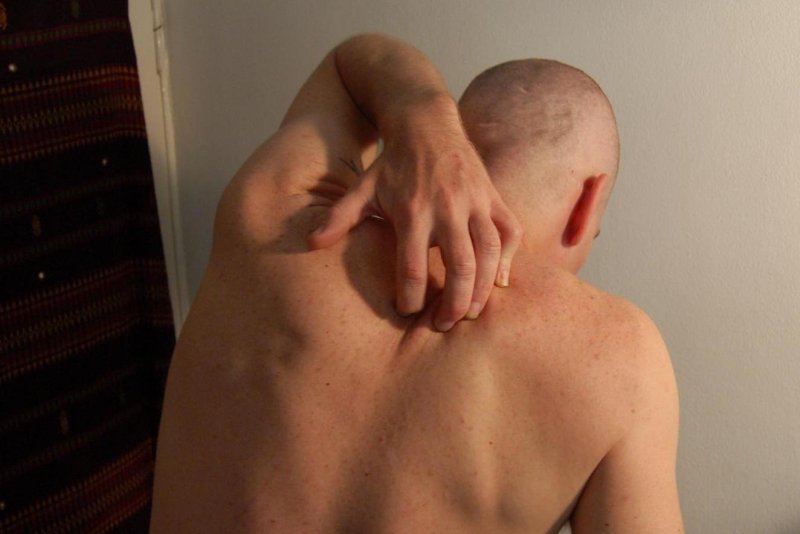1 of 5 | A new study reveals that 42% of patients with skin diseases experience sleep disturbances. Photo by Orrling and Tomer S/Wikimedia Commons
NEW YORK, Oct. 12 (UPI) — A comprehensive global study has found that 42% of patients with skin diseases suffer from sleep disturbances.
These findings were presented at the European Academy of Dermatology and Venereology Congress in Berlin.
The study, known as the ALL Project, analyzed data from over 50,000 adults in 20 countries across five continents to evaluate the impact of skin diseases on individuals.
According to the project’s findings, sleep disturbances have wider implications for the quality of life of patients. In comparison to participants without a skin disease, almost half (49%) of the patients with skin diseases reported reduced productivity at work, while only 19% of those without skin diseases reported the same.
The study identified itching as the main symptom affecting the sleep of patients with skin diseases, with 60% reporting itching as a disruption. Burning sensations or tingling also affected the sleep of 17% of patients.
In addition, patients with skin diseases experienced a higher frequency of waking up feeling fatigued (81% compared to 64% for those without skin diseases), daytime drowsiness (83% versus 71%), tingling sensations in the eyes (58% versus 42%), and repeated yawning (72% versus 58%).
First of its kind
“Our study is the first to highlight the significant impact of sleep disorders on the physical functioning of patients with skin diseases,” said lead author Dr. Charles Taieb. “These disorders lead to a significant deterioration in quality of life. These results emphasize the need for early detection and effective management of sleep disorders.”
Dr. Taieb also explained that the ALL Project aimed to study all types of skin diseases, skin colors, and skin conditions in order to shed light on the impact of skin diseases and improve patients’ quality of life.
“Healthcare providers should include questions about sleep disorders in examinations of patients with skin conditions to understand the full impact of these diseases,” he added.
Painful skin condition
The study also examined the impact of living with hidradenitis suppurativa, a painful, chronic skin condition that causes abscesses and scarring. The study found that 77% of patients with this condition reported feeling stigmatized, with 58% experiencing ostracization or rejection from others.
More than half of these patients stated that others avoided touching them (57%) or approaching them (54%) due to their condition, leading to significant consequences for their self-perception, relationships, and daily lives.
Additionally, the study revealed that patients who reported feeling stigmatized were less likely to take selfies (52%) compared to those without the condition (84%) and were more likely to constantly manage their appearance when encountering a mirror (72% versus 34%).
Recognizing the impact
Dermatologist Dr. Naina Rengarajan emphasized the importance of the study, stating, “As dermatologists, we witness daily how much skin diseases affect our patients’ quality of life. This data is crucial in drawing attention to the emotional, social, and financial burden that skin disorders pose.”
Dr. Rengarajan also highlighted the prevalence of sleep disturbances in patients with skin diseases. “Many common skin disorders cause skin pain, itch, or odor that disrupts a patient’s ability to rest. The emotional and psychological consequences of visible disorders also contribute to insecurity and shame, which will undoubtedly affect sleep,” she explained.
Understanding all skin conditions
Dermatologist Dr. Erin Barrett, who was not involved in the study, commended the ALL Project for assessing the relationship between sleep disturbances and skin conditions across the board. She emphasized the need for healthcare providers to inquire about sleep disturbances in patients with skin diseases and advocated for more research in this area.
“Sleep plays a vital role in healing and has a tremendous impact on our daily activities and well-being. Healthcare providers need to be educated on addressing sleep disturbances in our patients,” Dr. Barrett noted.
Dr. Justin Ko, director and chief of medical dermatology for Stanford Health Care, emphasized the significance of studies like this in bringing attention to the burdens of skin diseases and encouraging open communication between clinicians and patients about these issues.



